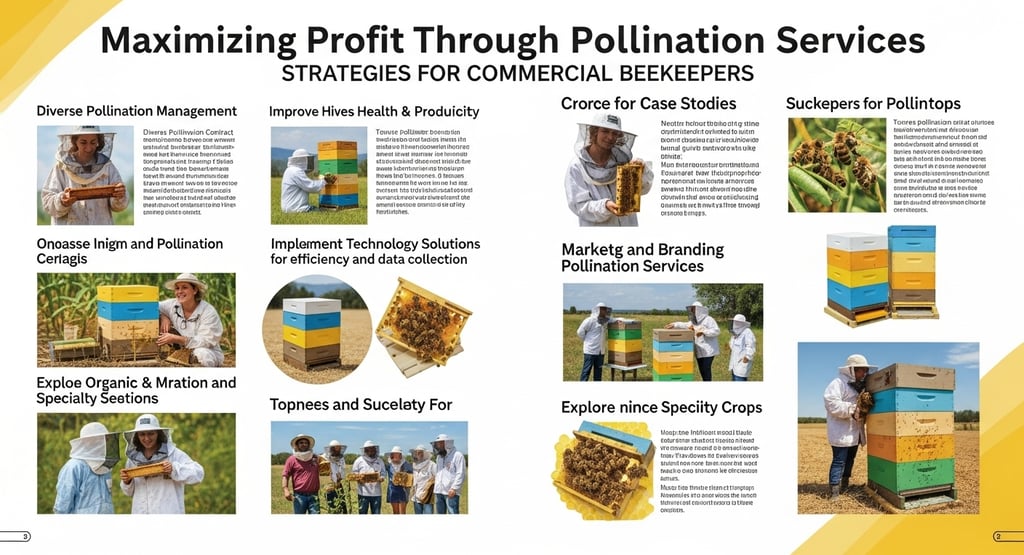Maximizing Profit Through Pollination Services: Strategies for Commercial Beekeepers
Beyond honey and wax, pollination is an often underestimated revenue stream for modern beekeepers.


Introduction
Beyond honey and wax, pollination is an often underestimated revenue stream for modern beekeepers. By supplying healthy colonies to farms, beekeepers earn significant income while boosting agricultural productivity.
Heliotrope Bee, trusted by beekeepers worldwide, equips professionals with protective gear and operational insights to scale pollination services safely and efficiently.
1️⃣ The Economic Impact of Pollination
Over 70% of global food crops rely on insect pollination.
Bees contribute billions of dollars to agriculture annually.
One colony can increase crop yield by up to 30% in certain orchard systems.
Pollination contracts bridge agriculture and apiculture, stabilizing income during periods of low honey flow.
2️⃣ Key Crops That Demand Bee Pollination
Almonds: California’s orchards alone require over 2 million colonies each year.
Apples & Pears: Fruit set quality depends heavily on bee visits.
Blueberries & Raspberries: Benefit from buzz pollination for larger, uniform berries.
Seed Crops: Carrots, onions, and hybrid seeds often need cross-pollination by bees.
By aligning with growers, beekeepers ensure steady business relationships.
3️⃣ Planning for Pollination Contracts
3.1 Negotiating Agreements
Discuss colony strength standards (frames of brood, queen health).
Agree on placement, rental fees, transport logistics, and insurance.
3.2 Regulatory Considerations
Maintain up-to-date inspection certificates.
Ensure compliance with pesticide and movement restrictions.
4️⃣ Transporting Bees Safely
Colonies must be:
Properly ventilated
Securely loaded at night or dawn to avoid bee loss
Monitored for stress indicators post-move
Heliotrope Bee’s suits and gloves help during night loading when bees are calm but sensitive.
5️⃣ Apiary Preparation for Pollination
Strengthen hives weeks before transport.
Treat for mites and diseases to ensure robust pollinators.
Avoid splitting colonies immediately before contracts.
Healthy colonies build your reputation — growers prefer reliable partners.
6️⃣ Placement and Hive Management in Fields
Place hives in sunny spots, sheltered from wind.
Spread colonies evenly to cover crop bloom uniformly.
Provide supplemental feed if bloom nectar is insufficient.
Monitor colonies weekly; adjust placement if bee foraging appears low.
7️⃣ Risk Management
7.1 Pesticide Exposure
Communicate with growers about spray schedules.
Move colonies if necessary to prevent losses.
7.2 Theft and Vandalism
Brand hives clearly; use GPS trackers if needed.
Insure colonies when deployed far from your main apiary.
8️⃣ Maximizing Seasonal Profit
Combining honey production with pollination creates balanced cash flow:
Spring: Almond pollination
Early summer: Orchard or berry pollination
Late summer: Honey flow from wildflowers or clover
Diversify so no single revenue source jeopardizes your operation.
9️⃣ Tools and Equipment for Smooth Operations
Reliable protective wear minimizes stress during:
Colony inspections in flowering crops
Swarm control checks
Emergency treatments
Heliotrope Bee designs suits and gloves specifically for comfort during long field days and quick roadside inspections.
10️⃣ Building Long-Term Grower Relationships
Success rests on trust:
Deliver healthy colonies on time.
Provide transparent reports on colony condition.
Resolve issues promptly — reputation spreads fast in agriculture.
Many large-scale pollination providers grow through referrals and consistency.
11️⃣ Sustainability & Ethical Considerations
Avoid overworking colonies to exhaustion.
Rotate resting periods to rebuild strength.
Participate in local efforts to expand bee forage and safe pesticide practices.
Your reputation as an ethical pollinator manager attracts loyal growers.
✅ Conclusion
Pollination is more than a side business — it’s a core profit pillar that strengthens agriculture and secures the beekeeper’s bottom line. By mastering contract management, hive logistics, and risk mitigation, commercial beekeepers gain stability and expansion opportunities.
Heliotrope Bee, the world’s largest manufacturer & supplier of beekeeping protective supplies, proudly supports pollination professionals with robust suits, ventilated jackets, gloves, and tailored gear packages for high-volume operations.
Explore our specialized equipment & connect with us:
📧 sales@heliotropebee.com
🌐 www.heliotropebee.com


